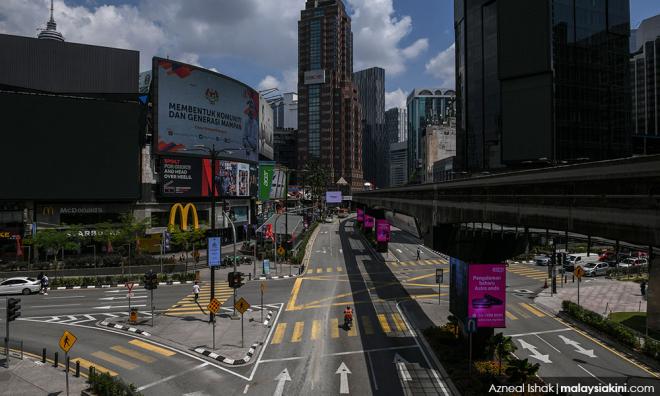
Published by The Malaysian Insight, image from Malay Mail.
AS countries across the globe are trying to handle the setbacks resulting from the deadly Covid-19 outbreak, global supply chain and international trade have been severely disrupted due to the imposition of movement restriction and social distancing measures by governments worldwide.
The World Trade Organisation (WTO) has projected world trade to decline between 13% and 32% this year, worse than during the global financial crisis (GFC). The recovery in year 2021 was also said to be uncertain contingent on how long the pandemic lasts and the effectiveness of government policies.
Even before the pandemic, trade was already in a dull position on the back of US-China trade disputes and slow economic growth.
What makes it worse is the more interconnected value-chain linkages and extensive lockdowns in countries, including Malaysia that has been extended until May 12.
The pandemic is set to, or rather, has hit the services trade the hardest due to international travel measures and the closure of retail stores.
Malaysia has not been spared from this shock, given its openness to trade. Trade activity has fallen 12.7% on a monthly basis in February, hampered by supply-chain disruption due to factory closures in China.
According to the latest data from the Organisation for Economic Cooperation Development (OECD), Malaysia’s imported inputs embedded in gross exports (backward linkages) accounts for 36.9%, the third highest after Singapore and Vietnam. Malaysia’s role in foreign country’s exports (forward linkages) is not as high at 18.7%.
The backward linkages figure shows how vulnerable Malaysia’s trade position is due to our reliance on imports.
Another dampening factor to the current trade environment is that countries have started restricting or banning exports that are in high demand now, such as medical and food products, to ensure adequate domestic supplies. This is what we call part and parcel of deglobalisation.
According to the WTO, so far, 80 countries have imposed export prohibitions or restrictions due to the pandemic as of April 22.
Given the deglobalisation responses, what lessons can be learnt to support Malaysia’s vulnerability?
According to the World Bank, the do’s of trade policy responses during the pandemic should satisfy the following requirements:
* DO facilitate access to essential Covid-19-related medical goods and supplies;
* DO support consumption of essential items and limit negative impacts on the poorest;
* DO support exporters to maintain jobs and foreign exchange earnings;
* DO contribute to macroeconomic policy efforts to shield the economy from Covid-19-related downturns; and,
* DO streamline regulatory and border procedures to facilitate access to Covid-19-related medical goods and essential food products.
On the other hand, the don’ts of policy responses are as follows:
* DON’T constrain investment in and access to essential Covid-19-related medical goods and supplies;
* DON’T undermine consumption of essential goods or constrain job-maintaining exports; and,
* DON’T impose additional trade restrictions to protect domestic industries that have been badly impacted by weak demand.
Therefore, the direction of policy responses by the Malaysian government should be based on the fulfillment of these criteria, which are to address both health and economic crises.
Firstly, efforts to adjust to traditional trading partners can be done by enhancing regional cooperation, as no one has been spared from experiencing economic and health downturns. For instance, this initiative can be worked out within the Asean region.
The Asean+3, including South Korea, Japan and China, had agreed on April 14 to discuss means to combat the pandemic together, such as by providing adequate medical supplies, establishing a Covid-19 Asean Response Fund to ensure sufficient financing, keeping markets open for trade and investment to ensure food security, and expanding the scale of emergency stockpiles for the preparation of any possible upcoming pandemics.
Secondly, the government or companies can turn inward and focus on domestic-oriented activities to provide support when external-oriented sectors are struggling.
On the manufacturing front, local manufacturers need to think ahead by reassessing their supply chain – map all of the suppliers, understand the company’s critical vulnerabilities and take action to diversify risk and come up with a business continuity plan, as well as a plan for the workers.
Redesigning the supply chain, according to the Harvard Business Review, requires either having a backup source to the primary source or shifting production to a local base.
This brings us to the second option – to shift production locally for in-demand items, such as food. For the food sector, talk about food security have surfaced since the outbreak began due to concerns among the public.
So, government incentives in the form of subsidies or grants can be provided to farmers to increase domestic food production by the enhancement of modern farming with the adoption of technology.
Moreover, incentives are also crucial to attract younger generations to join the sector, as lack of manpower has been an issue in the past few years due to low wages.
For comparison, Japan has allocated RM8.9 billion (¥220 billion) for its companies to shift their productions from China back to its home country, and RM1 billion (¥23.5 billion) for those planning to shift productions to other countries.
French President Emmanuel Macron said supply chains will “need to become more French”; Germany’s Health Minister Jens Spahn wants to minimise “one-sided dependencies in order to win back national sovereignty”; while, Australia, South Korea, Taiwan and the US are considering relocating productions.
In conclusion, the action of countries turning inward has been driven by fears of dependency on external sources in the midst of this unprecedented shock.
Hence, trade policy responses focused on managing the crisis, be it regionally or domestically, should be constructed to mitigate more detrimental effects.
Nur Sofea Hasmira Azahar is Research Analyst at EMIR Research, an independent think tank focused on strategic policy recommendations based on rigorous research.

